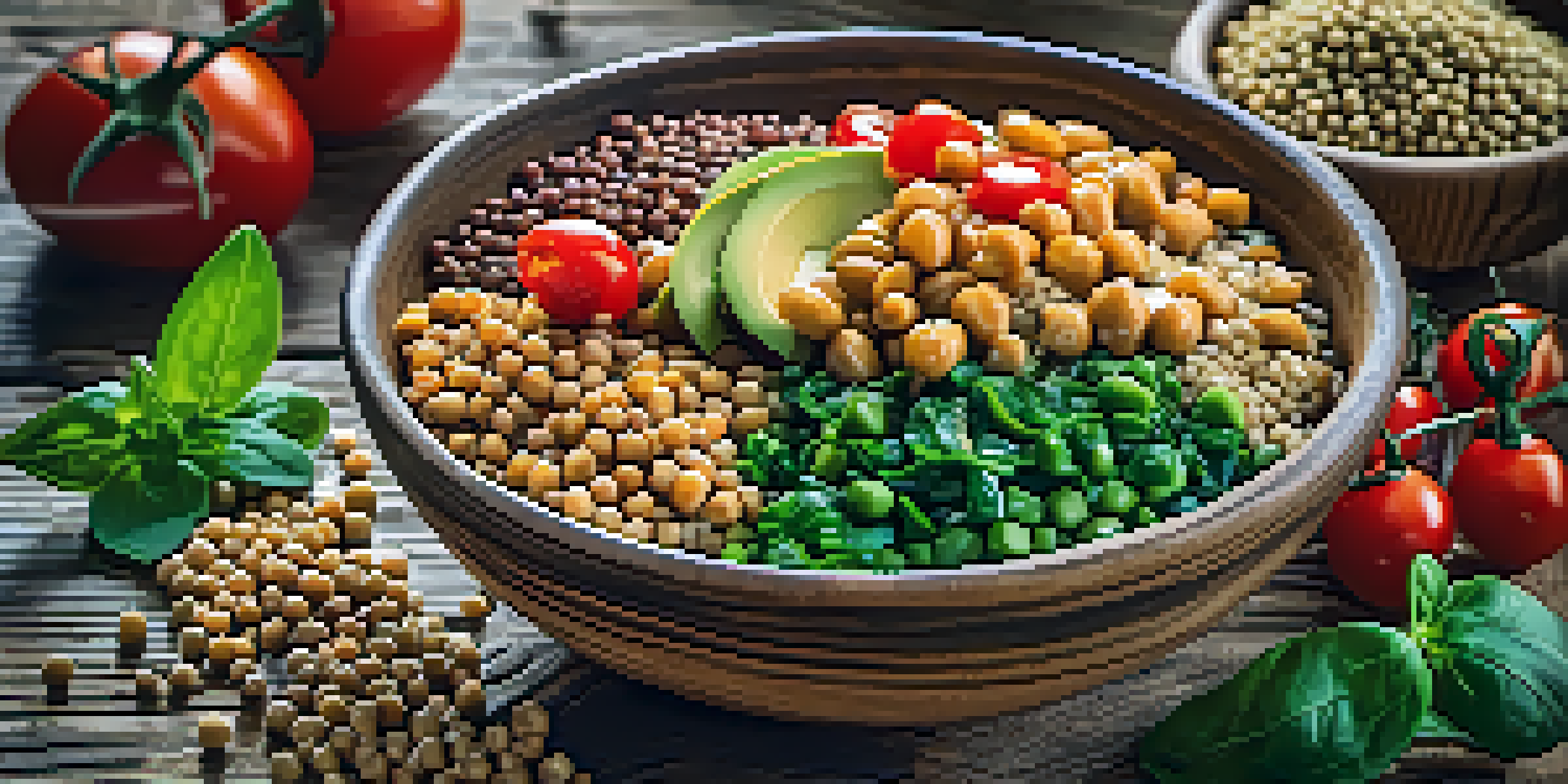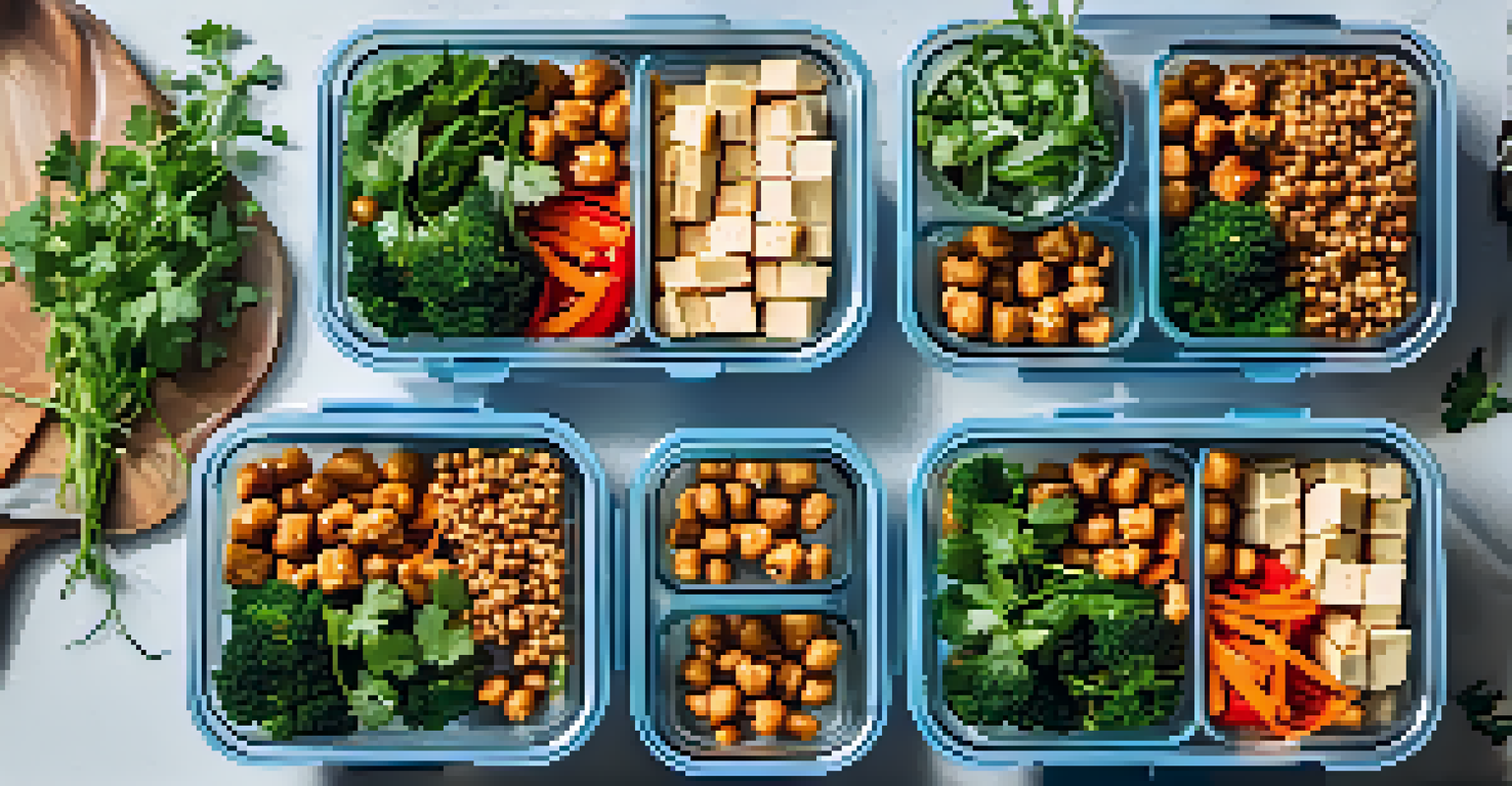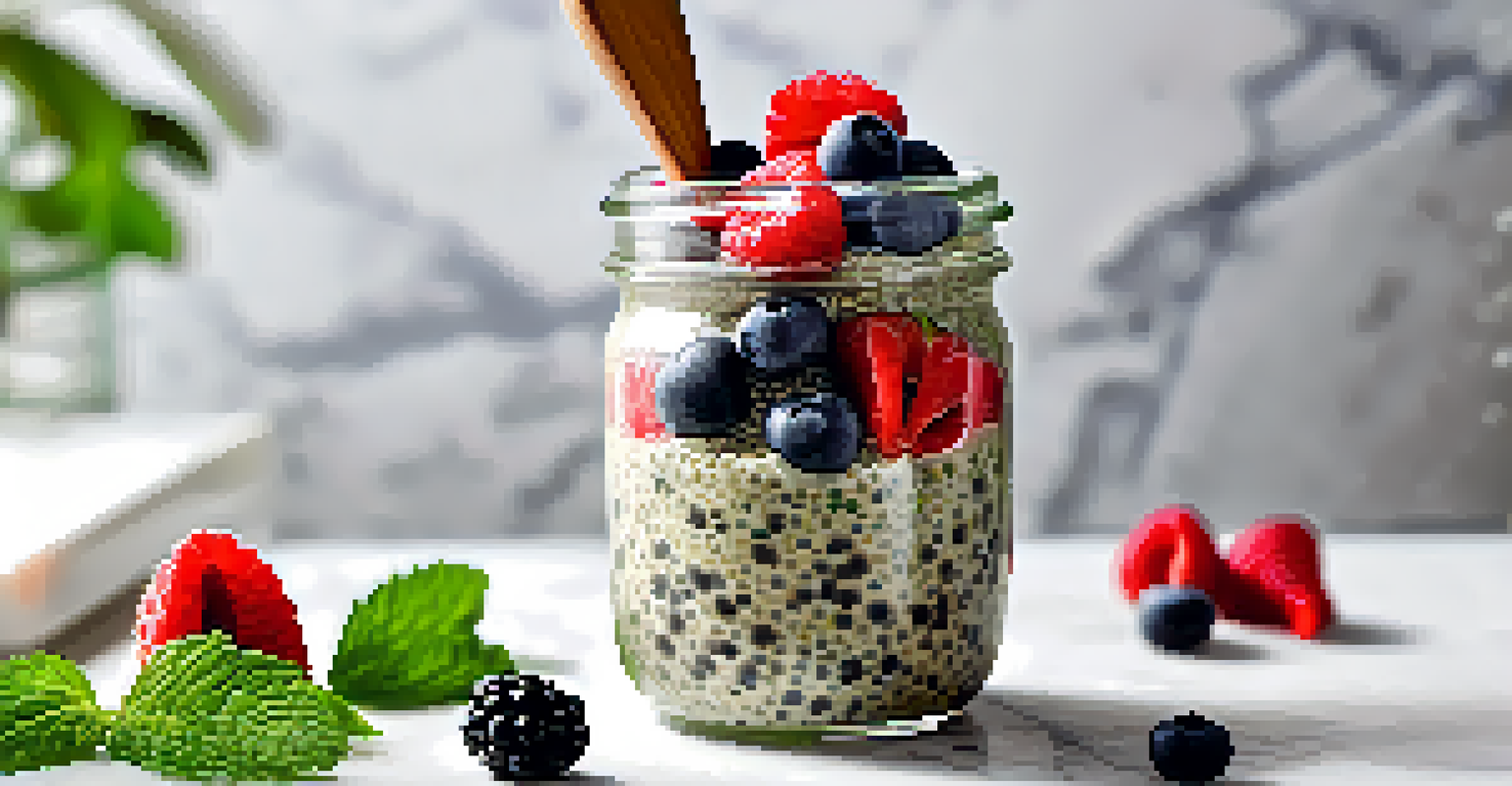Top 10 Alternative Proteins for Your Vegan Meal Plans Today

Why Alternative Proteins Are Essential for Vegan Diets
As more people embrace veganism, the demand for alternative proteins has skyrocketed. These proteins not only provide essential nutrients but also help maintain a balanced diet without animal products. Incorporating various protein sources can keep your meals exciting and flavorful.
Let food be thy medicine and medicine be thy food.
Traditional protein sources like meat and dairy are off-limits for vegans, which means finding suitable replacements is crucial. These alternatives often come packed with additional health benefits, such as fiber, vitamins, and minerals. By diversifying your protein sources, you can achieve a well-rounded diet.
Moreover, alternative proteins can contribute to sustainability by reducing our reliance on animal agriculture. Choosing plant-based proteins can lower your carbon footprint and promote ethical eating habits. With so many options available, it’s easier than ever to fuel your body while being kind to the planet.
1. Lentils: The Versatile Protein Powerhouse
Lentils are small but mighty when it comes to protein content, offering around 18 grams per cooked cup. They're incredibly versatile, making them perfect for soups, salads, or even lentil burgers. Plus, they come in various colors, each with its unique flavor and texture.

Beyond their protein punch, lentils are also rich in fiber, which supports digestion and helps you feel full longer. They can seamlessly fit into any meal, from spicy Indian dal to hearty lentil stew. If you're looking for a budget-friendly option, lentils are an excellent choice.
Alternative Proteins for Vegans
Incorporating a variety of alternative proteins is essential for maintaining a balanced and nutritious vegan diet.
Adding lentils to your vegan meal plans not only boosts the protein content but also introduces a wealth of nutrients. They're high in iron and folate, making them especially beneficial for those on a plant-based diet. With their numerous health benefits and adaptability, lentils deserve a top spot on your plate.
2. Quinoa: The Complete Protein Grain
Quinoa is often hailed as a superfood, and for good reason. This ancient grain is a complete protein source, meaning it contains all nine essential amino acids your body needs. With about 8 grams of protein per cooked cup, quinoa serves as a fantastic base for many vegan dishes.
The food you eat can either be the safest and most powerful form of medicine or the slowest form of poison.
Not only is quinoa nutritious, but it’s also gluten-free, making it an excellent choice for those with dietary restrictions. Its fluffy texture and nutty flavor make it a delightful addition to salads, bowls, or as a side dish. You can even use it in baking for a protein boost.
Incorporating quinoa into your meals can help you feel satisfied and energized. It’s packed with magnesium, iron, and antioxidants, offering a range of health benefits. With its versatility and nutrient density, quinoa is a staple you won’t want to miss.
3. Chickpeas: A Delicious Protein-Rich Legume
Chickpeas, or garbanzo beans, are beloved in the vegan community for their high protein content and versatility. With about 15 grams of protein per cooked cup, they can be used in a myriad of dishes, from hummus to salads and stews. Their nutty flavor and creamy texture make them a fantastic addition to any meal.
Beyond their protein power, chickpeas are rich in fiber, which aids digestion and promotes heart health. They can easily absorb flavors from spices and sauces, allowing for creative culinary exploration. Whether roasted for a crunchy snack or blended into a creamy dip, chickpeas are a delightful choice.
Health Benefits of Diverse Proteins
Sources like lentils, quinoa, and chickpeas not only boost protein intake but also provide vital nutrients and fiber.
By including chickpeas in your vegan meal plans, you’re not just boosting your protein intake; you’re also benefiting from their vitamins and minerals. They contain iron, magnesium, and B vitamins, which are essential for overall health. With their numerous benefits, chickpeas are a must-have in your pantry.
4. Tofu: The Protein Chameleon
Tofu is often seen as the go-to protein for vegans, and it’s easy to see why. With about 20 grams of protein per cup, tofu is incredibly versatile and can take on the flavor of any dish. Whether you’re stir-frying, grilling, or blending it into smoothies, tofu is a fantastic addition to your meals.
This soy-based protein is also low in calories and high in calcium, making it a great choice for those looking to maintain their weight. The key to delicious tofu lies in proper preparation—marinating and cooking it with a variety of spices can elevate its taste. You can enjoy it in savory or sweet dishes, making it a truly adaptable ingredient.
Incorporating tofu into your vegan meal plans not only boosts protein but also provides essential amino acids and minerals. It’s a wonderful source of plant-based protein for muscle building and recovery. With its health benefits and culinary flexibility, tofu deserves a prominent place in your refrigerator.
5. Tempeh: The Fermented Protein Powerhouse
Tempeh is a fermented soy product that packs a protein punch with around 31 grams per cup. Its firm texture and nutty flavor make it a fantastic meat substitute in various dishes. You can marinate it, grill it, or crumble it into tacos for a satisfying meal.
The fermentation process not only enhances its nutritional profile but also makes it easier to digest. Tempeh is rich in probiotics, promoting gut health along with providing essential amino acids. As a fermented food, it can help balance your gut microbiome, which is crucial for overall wellness.
Sustainability Through Plant-Based Foods
Choosing plant-based proteins contributes to a more sustainable lifestyle by reducing reliance on animal agriculture.
Including tempeh in your meals can elevate your protein intake while also offering unique health benefits. It's also an excellent source of vitamins, minerals, and antioxidants. With its bold flavor and nutritional advantages, tempeh is a worthy addition to your vegan meal plans.
6. Hemp Seeds: Tiny Nutritional Powerhouses
Hemp seeds may be small, but they are mighty when it comes to nutrition. With about 10 grams of protein per 3 tablespoons, they are a fantastic addition to smoothies, salads, and baked goods. Their nutty flavor complements various dishes, making them easy to incorporate into your diet.
These tiny seeds are also rich in healthy fats, particularly omega-3 and omega-6 fatty acids, which are essential for heart health. They provide a good balance of protein, healthy fats, and vitamins, making them a complete food. You can sprinkle them on yogurt or blend them into your favorite smoothie for a nutritional boost.

Adding hemp seeds to your vegan meal plans not only increases protein intake but also enhances overall nutrition. They contain magnesium, iron, and zinc, all important for various bodily functions. With their versatility and health benefits, hemp seeds are a must-have in your pantry.
7. Pea Protein: The Plant-Based Powerhouse
Pea protein has gained popularity in recent years, and for good reason. This plant-based protein offers about 25 grams per serving and is often found in protein powders and bars. It's easy to digest and hypoallergenic, making it suitable for various dietary preferences.
Derived from yellow split peas, pea protein is excellent for muscle building and recovery. It can be added to smoothies, soups, or even baked goods, providing a protein boost without altering the flavor of your dish. Its smooth texture makes it a great addition to shakes and smoothies.
Incorporating pea protein into your vegan meal plans can help you meet your protein needs while enjoying a variety of foods. It’s also rich in iron and other essential nutrients. With its numerous benefits and versatility, pea protein is a great choice for anyone looking to enhance their diet.
8. Chia Seeds: The Tiny Protein Giants
Chia seeds are tiny but mighty, offering about 5 grams of protein per 2 tablespoons. These little seeds are often praised for their omega-3 fatty acids and fiber content, making them a nutritional powerhouse. You can add them to smoothies, oatmeal, or even make chia pudding for a delicious snack.
When soaked in liquid, chia seeds expand and create a gel-like texture, which can be used as a binding agent in recipes. They’re perfect for vegan baking or as a thickener in smoothies. Their neutral flavor allows them to blend seamlessly into various dishes.
Incorporating chia seeds into your vegan meal plans not only boosts your protein intake but also enhances overall nutrition. They are rich in antioxidants, calcium, and magnesium, contributing to a well-rounded diet. With their health benefits and culinary versatility, chia seeds are a fantastic addition to any meal.